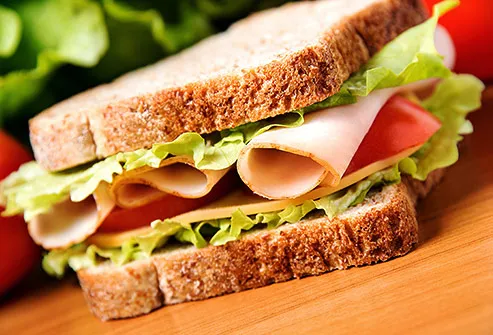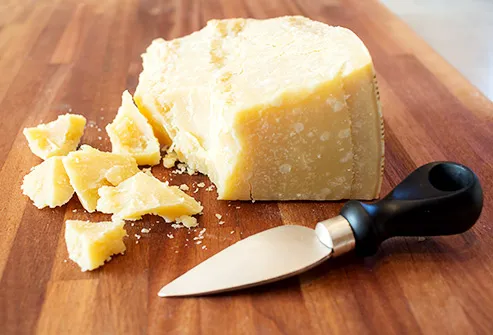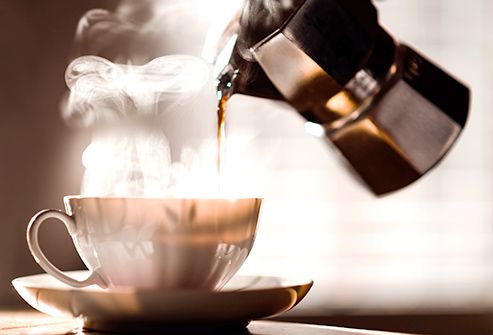Foods to Skip When You Have AFib

One serving of slices could have more than 1,000 milligrams of sodium. That's about half of what's OK for an entire day. Eating too much salt raises your blood pressure, and high blood pressure can raise your chance of AFib. It may also make symptoms harder to manage, so your odds of having a stroke go up. Other super-salty foods include pizza, canned soups, breads, and rolls. Check food labels to find lower-sodium options.

A popular fruit-flavored brand has about 11 grams of sugar in one packet -- almost 3 teaspoons of added sugar. While most adults have about 22 teaspoons every day, women should get no more than 6 a day, and men no more than 9. All that extra sugar can lead to obesity and high blood pressure, which can set off bouts of AFib. More surprising sugar sources: pasta sauce, granola bars, and ketchup.

Think cheddar, parmesan, and gorgonzola -- strong cheeses that have tyramine, an amino acid that helps raise blood pressure. Some scientists think eating foods with it may bring on symptoms for some people with heart disease. Tyramine is also in pepperoni and salami, sauerkraut and kimchee, and soybeans and snow peas.

The science on caffeine as a trigger for AFib is somewhat mixed. Older research suggests a link, newer studies don't. But either way, you should go easy on your coffee. Too much caffeine could raise your blood pressure and heart rate, which might set off episodes of AFib. Stick to no more than two or three cups a day. Or switch to decaf. Or do both.

Taking a blood thinner can help stop clots, which lead to a stroke, from forming. But warfarin (Coumadin, Jantoven) may not work as well when you eat foods high in vitamin K like lettuce, spinach, and kale. No need to keep these healthy veggies off your table, though. The trick is to eat the same amount of them every day. Then your doctor can adjust the dose of your medicine so it can still do its job.

If you take medicine to control your heart rhythm, you may want to skip this citrus fruit. Grapefruits and grapefruit juice have chemicals that can change the way you digest amiodarone (Cordarone, Pacerone) and dofetilide (Tikosyn). That makes side effects from these drugs more likely. Talk to your doctor about whether grapefruit is OK for you.

A glass with dinner is probably fine. Moderate amounts of alcohol -- that's one drink a day for women, one to two drinks a day for men -- may even be good for your heart. But indulging in more may raise your chances of getting AFib. Binge drinking -- having four drinks within 2 hours for women, five drinks for men -- bumps your odds even higher.

The saturated fats in beef, lamb, and pork are the kind that raise bad cholesterol in your blood. High levels of LDL cholesterol can lead to heart disease and AFib and raise your odds of a stroke. Put lean cuts of beef, such as round or sirloin, and pork tenderloin or loin chops on the menu instead. For burgers and meatloaf, choose at least 90% lean ground beef, or replace half the meat with beans for a twist that trims fat.

Dairy products made from whole or 2% milk, cream, and cheese are also sources of saturated fat. Your body already makes all the "bad" cholesterol it needs, and eating foods with saturated fat causes it to make even more. The better-for-your-heart choice: skim milk and low-fat or fat-free dairy products. Use heart-healthy oils like olive and canola for cooking.

Doughnuts, potato chips, and french fries may have what some doctors call the worst type of fat you can eat: trans fat. Unlike other fats, these are a double-whammy. They raise bad cholesterol and lower good cholesterol. Baked goods, including cookies, cakes, and muffins, may also have them. Watch out for "partially hydrogenated oil" in the ingredients.

Many brands add other ingredients to a super-sized shot of caffeine to give you a boost. That combo may be worse for your heart than caffeine alone. In one small study, energy drinks caused more changes to the heart's rhythm than other drinks with just as much caffeine. Another study linked energy drinks to bouts of AFib. Check with your doctor before downing these pick-me-ups.

Sure, the crystals are bigger than regular salt, and the flavor a little stronger. But sea salt still has about the same amount of sodium as table salt, contrary to what many people think. One teaspoon of either has about 2,300 milligrams of sodium -- the recommended limit per day. To help shake your salt habit, try different spices and herbs to season your food, such as ginger on chicken or paprika in soups.

These little grains have been stripped of the nutrients and fiber your heart needs to stay healthy. Fiber can help improve cholesterol levels. It may also lower your risk of heart disease, obesity, and type 2 diabetes -- conditions that are linked to AFib. Opt for whole-grain brown or wild rice. Whole grains are more filling and may help lower your chance of stroke.

The same icy drink that cools you off on a hot, steamy day may also set off an episode of AFib. Though research is still in its early stages, one recently published study suggests there may be a link between slurping a cold beverage, brain freeze, and an irregular heartbeat. If you notice a flutter after eating or drinking something cold, talk to your doctor.

Overeating even healthy foods can pack on the pounds. You have a higher chance of getting AFib when you're overweight. It also makes your AFib more likely to come back after certain treatments, like ablation. If you're obese (your BMI is 30 or more), aim to lose at least 10% of your body weight. Start with portion control: Split an entree with a friend when you're eating out, or pack up half your meal to go before you even take a bite.